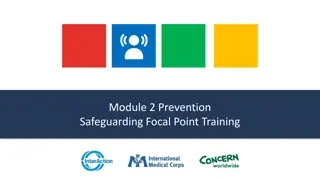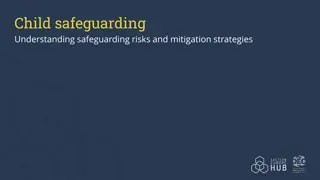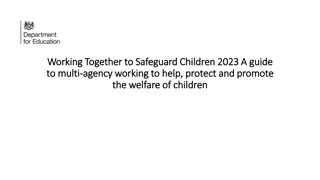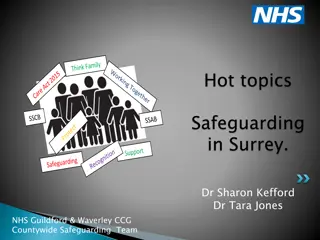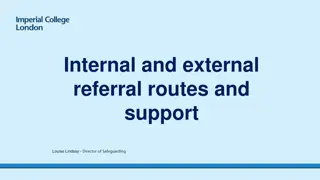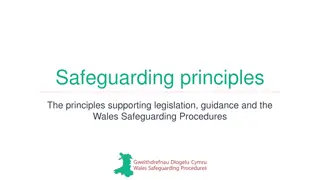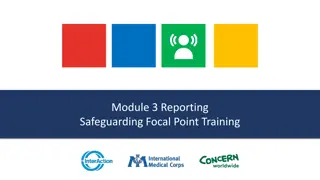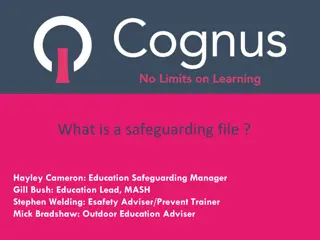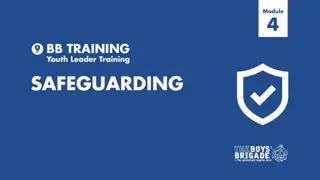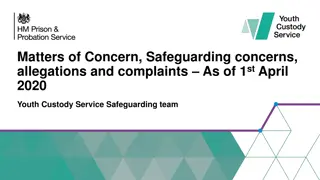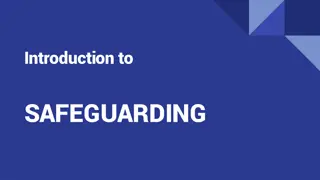Principles of Safeguarding in Education and Training
The Education and Training (Welfare of Children) Act 2021 mandates the application of statutory guidance on keeping children safe in education to various educational providers. The duty of care applies to all organizations and learners, emphasizing safeguarding as everyone's responsibility. Key starting points include reading the guidance and embedding safeguarding practices into everyday routines.
Download Presentation

Please find below an Image/Link to download the presentation.
The content on the website is provided AS IS for your information and personal use only. It may not be sold, licensed, or shared on other websites without obtaining consent from the author.If you encounter any issues during the download, it is possible that the publisher has removed the file from their server.
You are allowed to download the files provided on this website for personal or commercial use, subject to the condition that they are used lawfully. All files are the property of their respective owners.
The content on the website is provided AS IS for your information and personal use only. It may not be sold, licensed, or shared on other websites without obtaining consent from the author.
E N D
Presentation Transcript
The Education and Training (Welfare of Children) Act 2021 The Education and Training (Welfare of Children) Act 2021, which came into effect from 29 June 2021, means that the latest version of DfE s statutory guidance Keeping children safe in education , in force from September 2021 will apply to independent learning providers, special post 16 institutions/ independent special colleges and 16 to 19 academies to the extent that they have students or apprentices who are under the age of 18. It is appropriate that we have the same expectations of those additional types of providers now that the statutory guidance equally applies to them.
For clarity, and in line with the statement from Ofqual, the duty of care is in place for ALL organisations and ALL learners -from the start of their programme, right through to completion. Safeguarding for all it is everyone s responsibility
Where to start Read the guidance. A key starting point for providers emanating from KCIE (2021) is the requirement for all staff in a provider setting who work with children to read at least part one of the guidance, and those who don t work with children, to at least read Annex A (governors and proprietors have the discretion on the advice for those not working with children).
NCFE Level 1 Occupational Studies for the Workplace Unit 27 Maintenance of a safe, hygienic and secure working environment (M/505/4171) 1 Be able to maintain personal health and hygiene 1.1 Wear clean, smart and appropriate clothing, footwear and headgear Example: Can an Ammama ( is a type of turban that is religiously significant to Muslims) be worn in a factory?
Level 2 Employability Skills Unit 518 Managing personal finance 1.2 describe state benefits payable in different situations Example: Do you agree with refugees being entitled to UK income related benefits?
Functional Skills English Speaking, listening and communication 1. Participate in and understand the main points of simple discussions/exchanges about familiar topics with another person in a familiar situation. c) Communicate information so that the meaning is clear Example: Do you agree with a call centre company using a foreign call centre, where English is not the first language of the call centre operatives?
Top Tips for Increasing Open Discussions in Sessions Newspaper articles what is relevant in the news at the moment? Is there anything in the news that links with that vocational area? Set this as an independent learning task learners to come the following session with a new article they would like to discuss Google definitions / using a dictionary to define a new key word. Statistics of jobs in that vocational area you can split this down further into UK and more specifically in South Tyneside. Look at trends in statistics etc Tweet me a quick starter activity where they have to sum up their knowledge of a topic in 140 characters or less. Eg what is prevent? Encourage the learners to include a # Key word bingo a quick and fun starter or plenary activity that allows you to embed topics with the word versus the meaning (e.g Cuckooing- the practice of taking over the home of a vulnerable person in order to establish a base for illegal drug dealing, typically as part of a county lines operation. Comparing South Tyneside to other parts of the UK or world for example in the UK education or training age 16-19 is compulsory is this the same else where? Why? Write your reply display a controversial statement or question of your choice and learners have to write their response. Taboo game learners describe terms without using the particular words and someone else has to identify the term they are describing. A good way to encourage the use of correct terminology Have a vote in the class for example do you want to do this as a paired activity or individually this gives you the opportunity to discuss democracy and embed maths with ratio Discussion of wages for a job within that sector. Salary vs wages what is the difference? How much does this work out per hour etc. Independent learning learners to find a real life example to bring to the following session. For example if you have recently covered health and safety how have they noticed or seen health and safety since the last session? Qualifications needed and requirements for a given job for example female carer only is this discriminatory? Why / why not? Learners could research job vacancies in the sector independently then discuss which are suitable to apply for?


